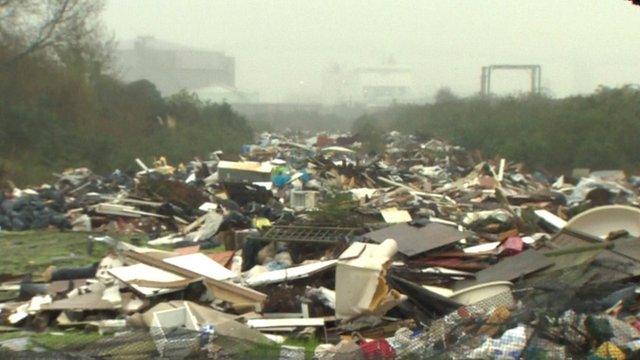How do you stop fly-tipping and littering?
- Published
- comments
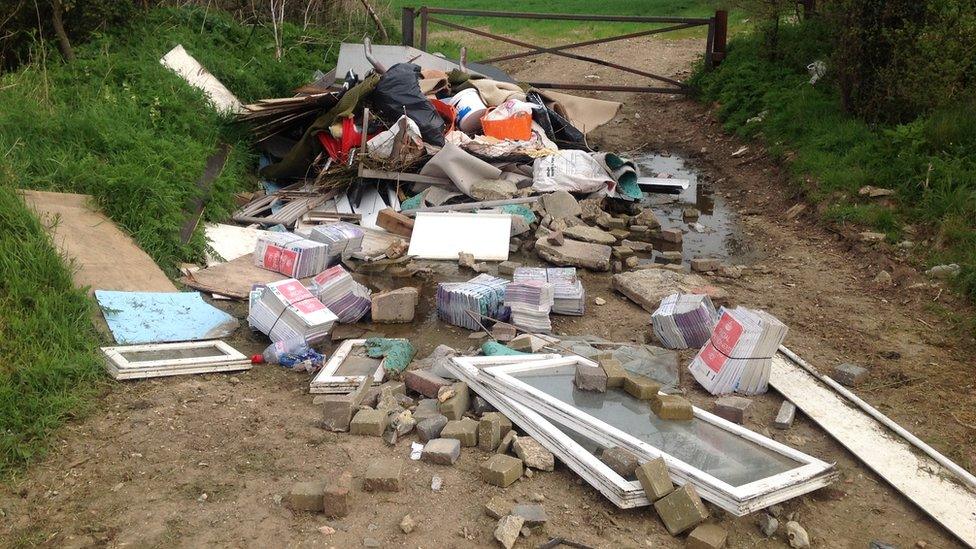
What are the solutions to the problem of fly-tipping?
The scourge of fly-tipping across England is getting worse with councils spending more than £67m to clean up public land and prosecute anyone they catch, according to official figures. So what should be done about the problem?
From old mattresses and fridges to tyres and masonry - and even coffins and live turtles - almost a million incidents of rubbish dumped illegally are recorded each year.
Councils have been given new powers to fine people up to £400 for "smaller" offences, but this depends on evidence. It has left local authorities having to consider new ways to clamp down on those who illegally dump their waste - or try to persuade them not to do it in the first place.
Whether it is cutting-edge DNA profiling or covert surveillance, online naming and shaming or conscience-pricking children's artwork, BBC Inside Out has been exploring the different ways to stop dumping and littering.
For more stories from the BBC England data unit follow our Pinterest board, external
Portrait of a tipper
Can DNA Tests identify litter louts?
If neither the carrot nor the stick brings down illegal dumping, could science hold the key?
In Hong Kong a campaign group used the DNA found on litter to create a photo-fit picture of the alleged culprits. "The Face of Litter", external was used by Hong Kong Cleanup and communications firm Ogilvy & Mather, working with a forensics company to create the images.
DNA can narrow down the search to gender and some visible characteristics, such as the most likely hair colour, eye colour and ethnicity of the litterbug.
Rafael Guida of Ogilvy said: "While this method may not identify specific individuals, it will be enough to make people think twice about littering. The campaign combines a public service message with science and technology, enabling us to communicate with Hong Kongers in a very different way."
However, Dr Denise Syndercombe-Court, reader in forensic science at King's College London, said: "I think it's crazy talking about catching somebody who has dropped litter.
"It's too expensive. The result that you get can't be used in a court of law.
"It won't be precise enough and it will mean the law enforcement agencies will be targeting people, the majority of whom are going to be innocent."
For the time being at least, councils will have to rely on trying to catch offenders in the act.
Big Brother
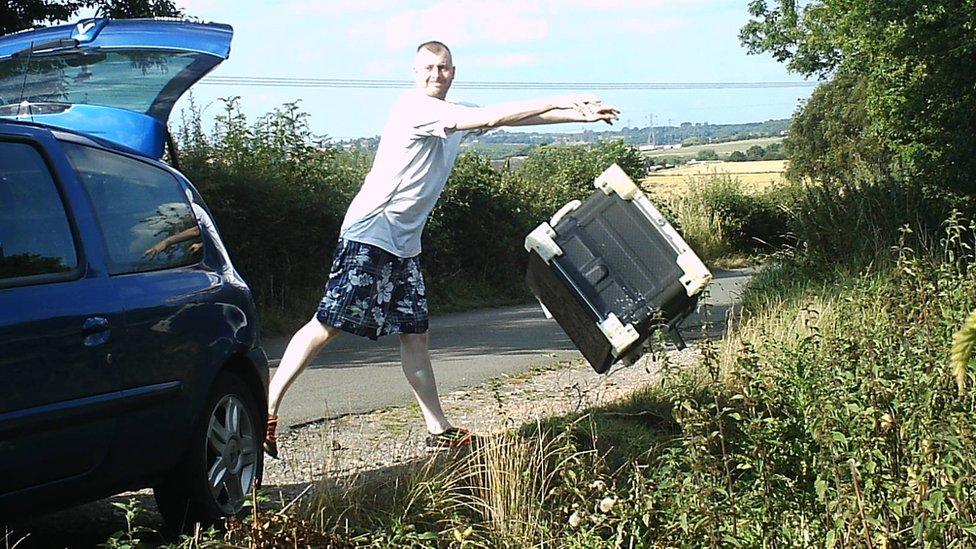
Richard Weston was caught on camera throwing a kitchen appliance into a ditch
As the dishwasher tumbled from his hands into the weeds at the side of the road, Richard Weston was caught on camera by a council surveillance operation.
The 38-year-old of Woodville, Derbyshire, was fined £1,200 in April after pleading guilty to dumping waste illegally.
Matt Holford, environmental health manager at South Derbyshire Council, says surveillance works and appears to have been a deterrent.
"We have adopted the use of inconspicuous, highly mobile surveillance cameras to help with fly-tipping enforcement work and as a result we've recently caught a number of waste offenders.
"We have secured four successful convictions in the last 12 months and have interviewed 10 people under caution in the last three months.
"Since April 2016 we've recorded a significant reduction in fly-tipping incidents again."
South Derbyshire Council, which had to clean up after 498 incidents of fly-tipping in 2014-15, is not alone in using surveillance tactics. Rhonda Cynon Taff Council in south Wales puts wardens on the streets with cameras to catch people dropping litter, which it then posts online, external for the public to see.

Fly-tipping and the law
Fly-tipping is a criminal offence punishable by a fine of up to £50,000 or up to five years' imprisonment.
From May 2016, councils in England were given the power to issue fixed penalty notices between £150 and £400 for "small-scale" offences.
Despite the threat of fines, fly-tipping has been getting worse, having previously been in steady decline. Statistics from Defra showed there were 900,000 cases of fly-tipping in handled by local authorities in England in 2014-15, a 5.6% rise on the year before.
Littering also costs the taxpayer between £717m and £850m a year to tidy up. However, fining people requires them to be caught first.
London boroughs make up seven of the 10 worst affected areas for fly-tipping by head of population.
Council workers have found everything from typical bulky items such as mattresses and tyres to the more bizarre. Redbridge Council staff discovered an empty coffin dumped with a pile of tyres behind some garages in Ilford in 2014. In a separate incident the same year they found two turtles in a shoebox in Hainault and sent them to the RSPCA.

The trees have eyes
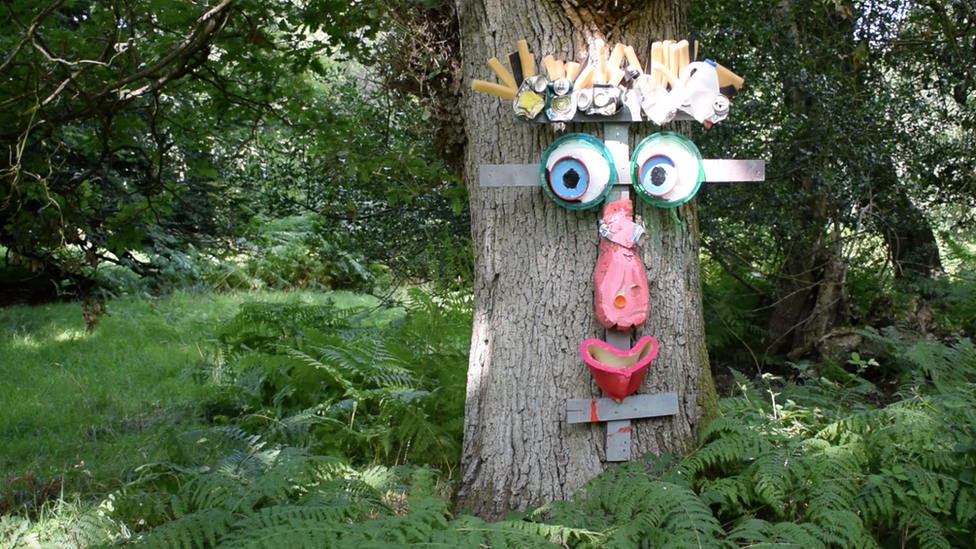
Children's artwork gives people in the Forest of Dean the impression they are being watched
Perhaps a softer approach will work. In the Forest of Dean, six primary schools and one secondary school work with a charity using children's art to make would-be dumpers and litterers think again.
Fifty children's models of faces, attached to trees at 16 sites, are intended to give people the impression they are being watched.
Environmental charity Hubbub has called it the "Communitrees" project.
The charity was inspired by similar schemes such as 10,000 Eyes in Rotterdam, which saw eyes painted on buildings and down alleyways in a bid to deter crime.
Elle McAll from Hubbub said: "The eyes on the trees form a new community of 'Communitrees', keeping a watchful eye on their forest floor to deter litterers and encourage others to keep their ancient flora and fauna clean and green.
"We're are collecting data at seven of the Communitree sites. Early indications suggest a slight reduction in the quantity of litter found. The full impact of the campaign is being assessed and will be widely shared both good and bad in the next few months."
Forest of Dean District Council had to handle in excess of 800 incidents of fly-tipping in 2014-15, costing more than £34,000 of taxpayers' money to clean up and a further £56,000 to investigate and take action.
Naming and shaming
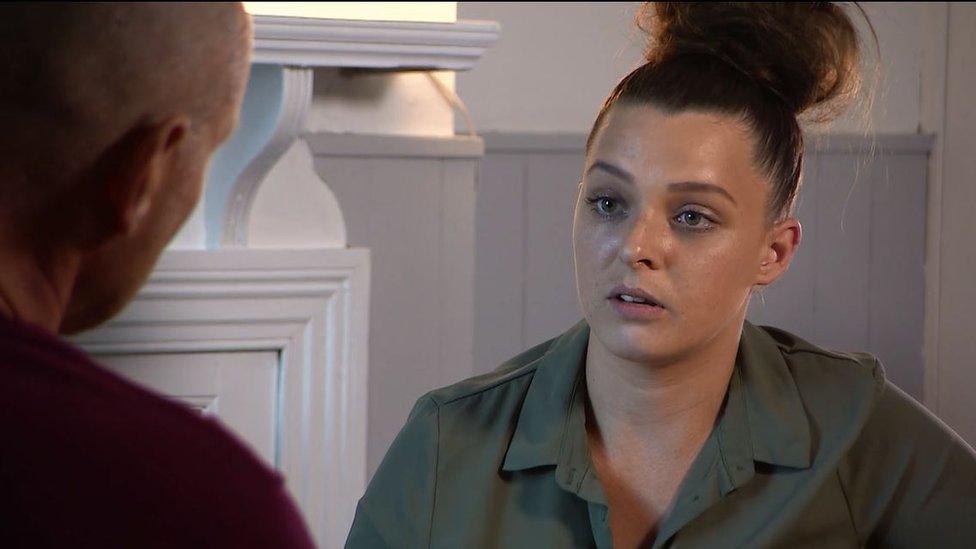
Natalie McDermoth was named in a council "hall of shame"
Can the shaming of others deter would be fly-tippers and litterbugs from blotting the landscape in the first place?
That was how Croydon Council, which has seen an 84% rise in fly-tipping since 2014, decided to handle the problem. (The latest figures showed London was the worst-affected area of England with 367,075 incidents of fly-tipping across the capital in 2014-15.)
A £420 fine was handed to 24-year-old Natalie McDermoth for dropping a single cigarette butt. She had refused to pay an £80 on-the-spot fine and was taken to court.
Yet while the financial penalty was significant, it was not the end of the punishment.
Miss McDermoth was among more than 100 people added to a "hall of shame" published by the authority for littering and fly-tipping.
"I was embarrassed," she said. "I was mortified. If my kids grow up and put my name in Google, that's what's going to come up."
Inside Out is broadcast on BBC One England on Monday, 19 September at 19:30 BST and nationwide on the iPlayer for 30 days thereafter.
- Published30 July 2016
